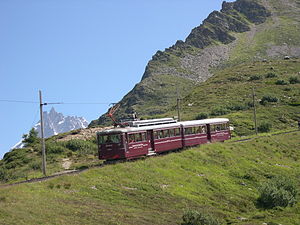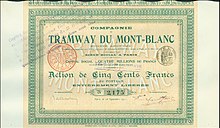| Mont Blanc Tramway | |
|---|---|
 A train of the Mont-Blanc Tramway A train of the Mont-Blanc Tramway | |
| Overview | |
| Termini |
|
| Service | |
| Type | Tramway/Rack railway |
| Operator(s) | Compagnie du Mont-Blanc [fr] |
| History | |
| Opened | 1907 |
| Technical | |
| Line length | 12.4 km (7.7 mi) |
| Number of tracks | 1 |
| Rack system | Strub |
| Track gauge | 1,000 mm (3 ft 3+3⁄8 in) |
| Electrification | 11 kV 50 Hz AC |
| Highest elevation | 2,372 m (7,782 ft) asl |
| Maximum incline | 24% |
| TMB route diagram | ||||||||||||||||||||||||||||||||||||||||||||||||||||||||||||||||||||||||||||||||||||||||||||||||||||||||||||||||
|---|---|---|---|---|---|---|---|---|---|---|---|---|---|---|---|---|---|---|---|---|---|---|---|---|---|---|---|---|---|---|---|---|---|---|---|---|---|---|---|---|---|---|---|---|---|---|---|---|---|---|---|---|---|---|---|---|---|---|---|---|---|---|---|---|---|---|---|---|---|---|---|---|---|---|---|---|---|---|---|---|---|---|---|---|---|---|---|---|---|---|---|---|---|---|---|---|---|---|---|---|---|---|---|---|---|---|---|---|---|---|---|---|
 | ||||||||||||||||||||||||||||||||||||||||||||||||||||||||||||||||||||||||||||||||||||||||||||||||||||||||||||||||
| Legend | ||||||||||||||||||||||||||||||||||||||||||||||||||||||||||||||||||||||||||||||||||||||||||||||||||||||||||||||||
| ||||||||||||||||||||||||||||||||||||||||||||||||||||||||||||||||||||||||||||||||||||||||||||||||||||||||||||||||


The Mont Blanc tramway or Tramway du Mont-Blanc (French pronunciation: [tʁamwɛ dy mɔ̃ blɑ̃], TMB) is a mountain railway line in the Haute-Savoie department of France. It is the highest in France and the fourth highest in Europe. It is also the only railway in France reaching over 2,000 metres above sea level.
The extensive views of Mont Blanc and adjacent mountains of the Mont Blanc massif provided by the tramway make it popular with tourists. Also, mountaineers and hikers use the tramway because its stops provide the jumping off points for many trails, as well as giving access to the refuge Nid d'Aigle [fr] close to the terminus of railway. The normal alpine mountaineering route to climb Mont Blanc starts at the tramway's terminus, Nid d'Aigle, and proceeds either to an overnight stop at the Tête Rousse Hut, or at the higher Goûter Hut.
Location
The line runs from a connection with the SNCF at Saint-Gervais-les-Bains Le Fayet station to the Nid d'Aigle station near the Bionnassay Glacier at an altitude of 2,372 m (7,782 ft). The initial intention was for the line to reach the much higher Aiguille du Goûter. Nevertheless, it remains one of the highest railways in Europe and the second-highest when considering only open-air railways. The Nid d'Aigle and Mont Lachat (2,074 m (6,804 ft)), the two highest stations of the line, are the only railway stations over 2,000 metres in France. Both are well over the tree line.
Technology
The line is 12.4 km (7.7 mi) long and has a rail gauge of 1,000 mm (3 ft 3+3⁄8 in). It is a rack and adhesion railway, using the Strub design to overcome a height difference of 1,792 m (5,879 ft). The line has an average gradient of 15% and a maximum gradient of 24%. Some 85% of the line is equipped with rack rail, with adhesion being used at the foot of the line and at intermediate crossing stations. The line is electrified using an overhead line at 11 kV and 50 Hz AC.
Operations
The line is operated by the Compagnie du Mont-Blanc [fr] which also manages the Montenvers Railway and many ski lifts in the Mont Blanc region. The first section of the line, to the Col de Voza, was opened in 1907. The line reached its current terminus in August 1914 when work was suspended, because of World War I, and never resumed. The line was worked by steam locomotives until it was electrified in 1956.
The line is worked by three motor coaches which are named Anne, Marie and Jeanne. These were the names of the three daughters of the line's owner at the time of electrification.
The journey time is one hour from Fayet to Bellevue with four or five trips operating per day.
The Mont Blanc Tramway is featured in the film Malabar Princess.
In late July 2010 the last section of the Tramway and the nearby Nid d'Aigle mountain refuge was closed for safety reasons for the rest of the operational season. This was due to concerns of a repeat of a potentially catastrophic flood from release of a vast quantity of water that had built up within an intraglacial pocket within the Tête Rousse glacier lying directly above it.
Rolling stock
When the line was electrified in 1956, three electric multiple units were purchased named Marie, Jeanne and Anne after the daughters of the founder. In 2023 these were replaced by four Stadler EMUs, named Marie, Jeanne, Anne and Marguerite.
Gallery
-
Terminus at Saint-Gervais-Le-Fayet (1)
-
 Terminus at Saint-Gervais-Le-Fayet (2)
Terminus at Saint-Gervais-Le-Fayet (2)
-
Snow blower
-
Saint-Gervais-Ville station
See also
References
- As the second and third highest, respectively the Petit train d'Artouste and the Chemin de fer du Montenvers, are just below 2,000 metres.
- "Nid d'Aigle Refuge (2372m), Massif du Mont-Blanc". www.chamonet.com. Retrieved 23 February 2016.
- SummitPost Tête Rousse Hut. Retrieved 17 August 2009.
- "Refuge de l'Aiguille du Goûter". www.camptocamp.org. Retrieved 23 February 2016.
- After the Gornergrat Railway
- "Catastrophes, avalanches, poches d'eau". www.glaciers-climat.fr. Retrieved 23 February 2016.
- New Stadler built trains for Mont Blanc tramway The Railway Magazine issue 1465 April 2023 page 90


